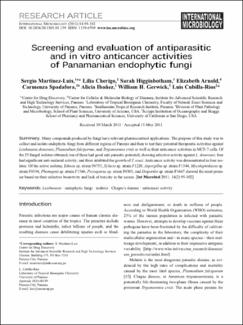| dc.contributor.author | Martínez-Luis, Sergio | |
| dc.contributor.author | Cherigo, Lilia | |
| dc.contributor.author | Higginbotham, Sarah | |
| dc.contributor.author | Arnold, Elizabeth | |
| dc.contributor.author | Spadafora, Carmenza | |
| dc.contributor.author | Ibañez, Alicia | |
| dc.contributor.author | Gerwick, William H. | |
| dc.contributor.author | Cubilla-Rios, Luis | |
| dc.date.accessioned | 2020-06-03T16:02:57Z | |
| dc.date.available | 2020-06-03T16:02:57Z | |
| dc.date.issued | 2011-03-30 | |
| dc.identifier.other | 10.2436/20.1501.01.139 | |
| dc.identifier.other | https://www.ncbi.nlm.nih.gov/pmc/articles/PMC3375117/ | |
| dc.identifier.uri | http://repositorio-indicasat.org.pa/handle/123456789/41 | |
| dc.description | Many compounds produced by fungi have relevant pharmaceutical applications. The purpose of this study was to collect and isolate endophytic fungi from different regions of Panama and then to test their potential therapeutic activities against Leishmania donovani, Plasmodium falciparum, and Trypanosoma cruzi as well as their anticancer activities in MCF-7 cells. Of the 25 fungal isolates obtained, ten of them had good anti-parasitic potential, showing selective activity against L. donovani; four had significant anti-malarial activity; and three inhibited the growth of T. cruzi. Anticancer activity was demonstrated in four isolates. Of the active isolates, Edenia sp. strain F0755, Xylaria sp. strain F1220, Aspergillus sp. strain F1544, Mycoleptodiscus sp. strain F0194, Phomopsis sp. strain F1566, Pycnoporus sp. strain F0305, and Diaporthe sp. strain F1647 showed the most promise based on their selective bioactivity and lack of toxicity in the assays. | en_US |
| dc.description.abstract | Many compounds produced by fungi have relevant pharmaceutical applications. The purpose of this study was to collect and isolate endophytic fungi from different regions of Panama and then to test their potential therapeutic activities against Leishmania donovani, Plasmodium falciparum, and Trypanosoma cruzi as well as their anticancer activities in MCF-7 cells. Of the 25 fungal isolates obtained, ten of them had good anti-parasitic potential, showing selective activity against L. donovani; four had significant anti-malarial activity; and three inhibited the growth of T. cruzi. Anticancer activity was demonstrated in four isolates. Of the active isolates, Edenia sp. strain F0755, Xylaria sp. strain F1220, Aspergillus sp. strain F1544, Mycoleptodiscus sp. strain F0194, Phomopsis sp. strain F1566, Pycnoporus sp. strain F0305, and Diaporthe sp. strain F1647 showed the most promise based on their selective bioactivity and lack of toxicity in the assays. | en_US |
| dc.language.iso | eng | en_US |
| dc.subject | Leishmania | en_US |
| dc.subject | endophytic fungi | en_US |
| dc.subject | malaria | en_US |
| dc.subject | Chagas’s disease | en_US |
| dc.subject | anticancer activity | en_US |
| dc.title | Screening and evaluation of antiparasitic and in vitro anticancer activities of Panamanian endophytic fungi | en_US |
| dc.type | info:eu-repo/semantics/article | en_US |
| dc.type | info:edu-repo/semantics/publishedVersion | |

